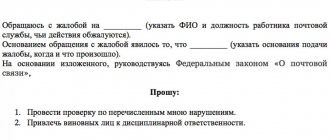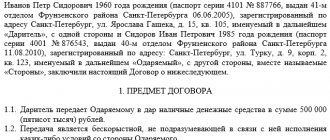In the article Creating Contractual Work Regulations, we discussed the principles of organizing contractual work in an organization and the risks that arise when working with documents. What stages does a contract go through during preparation, who should coordinate the work and what should you pay attention to when checking counterparties - read in the continuation of the article, prepared on the basis of a practical course by a teacher of the Russian School of Management, lawyer, trainer-consultant in the field of law Yulia Mezhnikova.
Contents of the document
The contents of the agreement should include a list of all conditions provided for by the parties and underlying the achievement of consensus on significant issues of the transaction.
The legislator has established that without the parties to the transaction agreeing on all the necessary conditions, the agreement cannot be considered concluded and does not bear legal consequences for its participants.
All the above conditions can be grouped into the following categories:
- Essential (mandatory for discussion and approval by the participants of all agreements without exception);
- Ordinary (established by law, required to be indicated in the document, but does not require additional approval);
- Random (included in the body of the document only at the mutual desire of the parties and endowed with legal force only after it is indicated in the contract and its further signing).
What should be in the contractual work regulations
The rules of contractual work must include the following aspects:
- The procedure for preparing draft agreements.
- Procedures for verifying counterparties.
- Agreeing on terms and conditions with interested employees.
- Coordination of contracts with counterparties.
- The procedure for signing contracts by authorized persons.
- Organization of contract execution.
- Monitoring the execution of contracts.
- The procedure for claims work.
- Storage and archiving.
Why is the project needed?
Perhaps, when concluding simple one-time transactions, it does not make sense to carry out a lot of preparatory work. However, for business entities, especially large companies, it is simply necessary. When concluding long-term contracts, multimillion-dollar transactions, it is important to pay attention to every detail.
Commercial firms work to make a profit, and the success of the transaction depends largely on how the contract is drawn up. By offering your project to the other party, you can take your own interests into account as much as possible. When receiving a project from a counterparty, it is important to study it very carefully. It should not conflict with the law, contain ambiguous phrases, legally illiterate formulations, or infringe on the interests of the other party. It is especially worth paying attention to the provisions on the responsibility of the parties and the procedure for resolving arising disputes.
Some people use standard contracts when preparing documents. Of course, they can be taken as the basis for the project, but you should not rely entirely on standard forms. They contain only the most general provisions, and therefore do not take into account the many nuances and subtleties of each type of contract.
Two approaches to working with contracts in a company
Work with contracts in an organization can be done in two ways:
- A centralized approach implies the presence of a special structural unit or working group that deals with contracts. The contractor’s task is to deliver the draft contract to this department, and specialists handle the approval, accounting and storage.
- The decentralized approach assumes that each contractor manages its contracts independently. Even if the company practices this approach, all original copies of contracts should be stored in one place: with the secretary, lawyer or in the office.
In order for contractual work to proceed without errors, it is necessary to introduce uniform rules for the preparation and conclusion of contracts in the company. When there is a system, it becomes unimportant who deals with the contract, because employees follow clear step-by-step instructions. Do not forget to separate the areas of responsibility of structural units and employees. Lawyers, production workers, financiers, and managers will want to add clauses that are important to them to the contract.
Coordinate the actions of all employees and management at every stage of the contract. The work on the contract of all interested departments must be controlled by one executor. It is desirable that this person be a sociable and balanced person.
Document the general rules:
- In a single document.
- In several interconnected local acts.
- In separate documents regulating individual stages: regulations on claims and claims, the procedure for checking counterparties.
- When reporting on the execution of the contract, indicate whether it is effective and what problems arise. This experience will help in the development of future agreements.
Who should be entrusted with drawing up contracts?
It is quite difficult to prepare a draft agreement competently, taking into account all the legal subtleties, without knowledge of the law. A professional lawyer or law firm, having special knowledge in this area and work experience, will help to avoid serious problems and mistakes that are often encountered when developing projects independently. Of course, such services cost money, but the consequences of concluding an unprofitable or illiterate contract can be much more expensive.
Law firms can not only develop projects, but also take part in negotiations on the protocol of disagreements to them. It will also be easier for a specialist to analyze the project provided by the counterparty. An experienced lawyer knows what points to pay special attention to, how best to formulate certain points, and how to protect the interests of his client. In addition, he will be able, if necessary, to draw up a protocol of disagreements to the proposed agreement. Many legal entities prefer to cooperate with lawyers on a full support basis.
Watch expressions
The total amount in the contract must be strictly fixed. To prevent expenses from becoming an unpleasant surprise, you should not allow open language in the payment section. Any generalizations without specifying exact figures should arouse suspicion: “payment”, “budget”, the phrase “and others”. Remove all vague references to money - it is better to sign an additional agreement to the contract later than to suddenly find yourself in debt.
If the text contains a price calculation formula, it should not contain unknown variables. For example, a contract for installation of carpet may indicate the price per square meter of coverage, but the total area may not be specified. As a result, there is a risk of a situation where the customer will understand the verbally agreed upon “200-300 square meters” as 200, and the builder will then count all 350, and the final price will be almost twice as high as expected.
If it is impossible to write down the exact amount, limit it to a range. Let's say you hire an advertising agency to launch your first online advertising campaign. The company's services are paid at a fixed rate, but expenses for Google are separate. It is quite difficult to predict the budget of a new campaign in advance, so it is worth specifying the upper limit in the contract. This way, you will make sure that the advertisers’ expectations coincide with your capabilities, and you will not find yourself in a situation where in the first three days the amount you set aside for the month disappears from your Yandex account.
The order of payments must be specified with the precision of a computer algorithm: in what parts the amount is spent, in what terms and on what the payment depends.
The standard wording “...services are paid for within three days after signing the act” should be supplemented with an indication of when the act must be signed and what will happen if this does not happen. Otherwise, the counterparty may, under various pretexts, simply not sign, and the “three days from the date of signing” allotted for payment will never come.
Any provision of the contract is useless until it is backed by sanctions.
Imagine that you are entering into a contract with an evil spirit, who, at every opportunity, will turn it upside down: he will do everything exactly as it is written, but not the way you would like. They didn’t set a deadline for completing the work - they didn’t receive the work, they didn’t indicate the time for making changes - they were left with a raw product. Therefore, deadlines should be set for each action specified in the contract, and it is better to tie them to specific dates, and not to events like the signing of acts.
Now about the result. The subject of the contract must clearly state what you want to receive. At first glance this seems obvious. But remember how many agreements are concluded with the wording “the subject of the agreement is the provision of [some kind of] services.”
For example, let’s take an agreement under which I register trademarks for my principals. I could write a vague “The subject of the agreement is the provision of services for registering a trademark.” Instead, I put: “The Contractor undertakes to obtain the original Certificate for the Customer’s trademark and transfer the original of this Certificate to the Customer.”
People don’t need some amorphous “let’s have more options, nothing suits us”, “come to our office tomorrow, we’ll discuss”...) arise, as a rule, where the scope of work and the procedure for its delivery are not specified in the contract quite detailed.
For example, a designer did an interior design, and graphics were rendered for four days without a break. And then the customer asked to make adjustments. If the contract describes the procedure for delivering the result of the work, then the designer can refer to it and offer the customer to change little things on the live project, leaving the computer model as is. But if this story is not spelled out in the contract, then with a high probability the customer will refuse the finished version, and the designer will have to do the visualizations again.
If you don't know how to write smart about responsibilities in a contract, write in your own words. The law does not prohibit the use of simple and understandable language. Direct “your” words will protect your interests better than vague “smart” ones.
Finally, any provision of the contract is useless until it is backed by sanctions. Prescribe monetary penalties for failure to fulfill any important condition and tie them to deadlines: a thousand ruble fine for each day of delay works better than just a thousand ruble fine. You may never have the opportunity to use these clauses, but the very presence of sanctions in the agreement greatly disciplines its participants.
Sometimes I write contracts for actors and bloggers to endorse famous brands - airlines, cars and all that. The resulting Talmuds are 15-20 pages long, precisely because all possible options for the development of the situation are taken into account.
An entrepreneur must look at contracts like a programmer looks at algorithms. Everywhere we need clear logic: “if - then - otherwise.” Then, no matter what happens, you will always have an action plan agreed upon with the other party.
How to draft a contract
The counterparty usually hopes that you will sign the paper he has drawn up without further ado. But remember that his version does not always take into account your interests.
What can you do here? You can prepare your own version of the agreement. If the counterparty doesn’t like it, you will look for a compromise together. There is another way out: thoroughly study the counterparty’s version, and then invite him to edit some provisions.
If you are planning a serious transaction, contact a legal specialist. The lawyer will study the document and identify all its hidden and obvious threats. He can also draw up a new version of the contract, which will be slightly more expensive. But you will be sure that all your interests are taken into account and are protected.
If you do not intend to use the services of a lawyer, then take note of the following facts:
- 1. Formulate the provisions of the contract so that they are all interpreted unambiguously. It is unknown how your future relationship with the counterparty will develop. If he finds some ambiguity in the contract and interprets it in his favor, the court may well agree with him. Avoid overly complex or vague language. The shorter and clearer they are, the better. Make sure you are familiar with all specific concepts. You can even provide at the beginning of the contract a separate clause dedicated to terms and their meanings.
- 2. Precisely describe the subject of the contract. Indicate all its characteristics: weight, quantity, color, model, etc.
- 3. If you enter into a contract for compensation, do not forget to indicate the price! Otherwise, the paper will be considered invalid.
- 4. Always set deadlines. If the contract concerns deliveries, then the timing is very important.
- 5. Pay special attention to those provisions of the contract that deal with the responsibility of the parties and circumstances that relieve the parties from liability (i.e., force majeure). It often turns out that your company is assigned too much responsibility (including in monetary terms), while the counterparty bears no responsibility at all.
- 6. Clarify under what conditions the contract can be terminated early, and how to notify the counterparty of termination. Methods and timing of notification must be specified.
- 7. Check the accuracy of the details – yours and the counterparty’s.
- 8. Having drawn up a draft contract, re-read it with a fresh mind and make sure that you have not missed anything. If you missed it, make corrections.
How is it different from an additional agreement?
The standard list of appendices to the contract is an additional agreement (concluded if necessary), acceptance certificates, protocols of disagreement between the parties. In the additional agreement, the parties indicate the changed conditions, new terms, quantitative and volume indicators (if this is allowed by the main contract). All documented changes are also an integral part of the contract.
Differences between additional agreements and annexes:
- The additional agreement changes the terms of an existing contract, and the specifications, terms of reference and lists of services describe in detail the details of the new deal.
- An additional agreement extends the validity period, expands or narrows the terms of the main contract. This cannot be done in the documents attached to the initial agreement. They are used exclusively to detail the subject of the contract and the procedure for its execution.
Additional agreements are drawn up if the parties need to resolve changes. Here's how to include appendices to a contract in a supply, contract or service agreement:
- Add a separate paragraph to the content.
- List the additions.
- Indicate that they are an integral part of the contract.
Why do we need contractual work regulations?
Contractual work needs to be formed as a business process: to ensure its efficiency, speed of decision-making, and interaction of all stakeholders. The result should be a structured, thoughtful result - an agreement that brings economic benefits and insures against risks. To do this, you need a contractual work regulation that will help:
- Organize business processes for contractual activities.
- Optimize the timing of procedures for drawing up and approving contracts.
- Improves the quality of contract preparation.
- Will reduce legal risks.
- Organizes protection of interests.
- Will increase the transparency of activities and management decision-making processes.
Main risks
9 common risks you may encounter when preparing contracts:
- Concluding agreements with problematic counterparties.
- The occurrence of adverse consequences caused by shortcomings in the contract.
- Exceeding the powers of persons who signed the agreement.
- Expiration of the term of office.
- Defects in the power of attorney.
- Lack of licenses and other special permits to carry out activities.
- Loss of documents during the approval process.
- Delays in the approval of contractual documents.
- Violation of terms and stages of contract execution.
We begin work on the contract
Work on a contract begins with negotiations with clients and counterparties. From the discussions, it becomes clear when it is time to prepare for the transaction and start working with the draft document.
First, it is sent for approval - both with internal and external clients (partners). Next comes the signing stage and finally the execution stage begins. During the process, the agreement must be stored somewhere, but access to it must be made available and it must be ensured that all interested parties have copies of the document.
If there is a question about completing a short transaction or an ongoing relationship, you need to think through the procedure for renewal and signing additional agreements.
"Electronic" contract
Let us now move on to a more detailed consideration of the remote form of concluding an agreement. As stated in paragraph 2 of Art. 160 of the Civil Code of the Russian Federation, a transaction can be concluded using an electronic signature. It is clear that we are talking here about the use of an electronic signature (simple or enhanced) in accordance with the Federal Law of 04/06/11 No. 63-FZ “On Electronic Signatures”.
However, in addition to the electronic signature of paragraph 2 of Art. 160 of the Civil Code of the Russian Federation allows the use of other analogues of a handwritten signature, without directly naming them. That is, the list of acceptable analogues is open. In practice, they can serve, for example, as dealer codes, various codes, PINs, or scanned copies of a “live” signature. At the same time, they perform the same role as an electronic signature, i.e. are a complete analogue of a handwritten signature and can confirm the signing of an agreement in electronic form.
But in order for such an equalization to occur, one important condition must be met: to provide for such a possibility by agreement of the parties (clause 2 of Article 160 of the Civil Code of the Russian Federation). Let us immediately make a reservation that such an agreement is required only in cases where equalization is not directly provided for by law. So, paragraph 1 of Art. Law No. 63-FZ carries out such an equation in relation to a qualified electronic signature (CES). Consequently, when the parties use the EPC, the agreements they conclude in electronic form have equal legal force with agreements on paper directly by force of law.
Exchange legally significant “primary data” with counterparties via the Internet. Free inbox.
Therefore, in this case, the parties to the contract do not need to make reservations or enter into separate agreements on paper, in which there is a condition that the parties recognize the same legal force of contracts in electronic form and on paper.
In other cases, such a reservation is necessary. Moreover, it is better if it is done in a regular paper document signed by both parties. This can be either a separate agreement on the use of analogues of a handwritten signature, or a special clause or section in any of the agreements concluded earlier. Although using an electronic agreement is also not prohibited.
The possibility of executing an agreement through the exchange of electronic documents is also recognized by judicial practice. For example, the Federal Antimonopoly Service of the Far Eastern District recognized that an agreement was indeed concluded between the parties in a situation where it was signed by exchanging scanned copies by email. At the same time, the court found that these copies of documents are identical, and the possibility of electronic exchange was provided for by the terms of the proposal to make an offer, which came from one of the parties to the agreement (resolution dated 04.21.14 No. F03-1251/2014 in case No. A37-1143/2013) .
The Arbitration Court of the North Caucasus District recognized the agreement as concluded, the terms of which were set out in emails sent to each other by the counterparties. Moreover, in this case, no special agreement was concluded between the parties providing for the possibility of such electronic exchange of documents. But the court noticed that the party that received by e-mail the acts of transport and forwarding services provided under the contract concluded in this manner made payment for the services provided in full accordance with the documents received by e-mail. The court recognized these actions as confirmation of the possibility of exchanging documents via e-mail (resolution of the Federal Antimonopoly Service of the North Caucasus District dated 08.08.12 in case No. A53-11601/2011). A similar approach to an agreement allowing electronic signing of an agreement can be found in the resolution of the Federal Antimonopoly Service of the North Caucasus District dated April 12, 2011 in case No. A63-4698/2010).
For what purpose can contracts be concluded?
Each capable citizen of the Russian Federation, on average, enters into about 10 transactions per day, accompanied by an oral agreement between the parties. The statistics for written documents are much smaller – no more than two documents per Russian per day.
Current legislation allows the use of both written and oral forms. However, for a number of transactions characterized by the complexity of the legal consequences of both parties, mandatory strict requirements have been established:
- Written opinion only;
- The need for notarization.
Documentation of any contractual legal relations pursues the following goals:
- Accurate written recording of all agreements reached between the parties;
- Consolidation of an exhaustive list of rights, obligations and legal consequences of their failure to comply;
- Protecting the interests of the parties to the transaction from violations by each other, third parties or government bodies.
If it is necessary to protect the position of one of the parties in court, an oral agreement cannot be presented as a strong evidence base. If there is a written form, as a rule, the dispute is resolved through pre-trial settlement.
Forms and types of contracts
The Civil Code establishes cases of mandatory written form of agreement
The codification of civil legislation establishes the following possible or necessary forms of contracts:
- Oral, which is based on verbal reaching a consensus between the interests of the parties to the transaction.
- Written, the essence of which is reflected on paper and electronic media. The presented form includes two subspecies:
- subject to mandatory certification by notary authorities;
- subject to mandatory state registration.
In a number of legal relations, subjects are authorized to make independent decisions on the form of the concluded agreement. However, for some transactions (for example, the purchase and sale of real estate), the rule of notarization and registration with government bodies is mandatory.
Types of contracts are fixed by the Civil Code of the Russian Federation and other regulatory legal acts, including by-laws. The types of documents presented include:
- Agreement on the provision of property for rent;
- Rental;
- Insurance;
- To provide services on a paid basis;
- Contract of employment;
- Agreement with the bank on opening a deposit;
- Mena;
- Donation, etc.
The agreement must have the signatures of the parties
The name of the contract and its actual belonging to one of the presented types are not always identical concepts. The name can be indicated at the request of the parties, and the type is determined in accordance with the subject and essence of the rights and obligations established in the document.
Structure
Each agreement concluded in writing can be conditionally divided into the following component parts:
- Preamble, including the header of the document with the date, names of the parties, and indication of the place of detention;
- Subject part (essence of the transaction);
- Other terms of the document.
Each of the presented sections must include relevant information and carry a certain semantic load.
Introductory part
The preamble is the first component of the contract. In fact, it is an introduction, and should consist of:
- Indications of the type of agreement (rent, lease, insurance, etc.). Based on the title of the document, it should be possible to determine the nature of the legal relationship in the area of which the transaction was concluded;
- The date according to which the beginning of the parties’ obligations arising from the transaction will be determined;
- Place of signing (if the parties have the same citizenship, it does not matter much. However, if a transaction is concluded by citizens with different indigenous people, the regulatory framework will be determined in accordance with the place of conclusion);
- Data about the counterparty (name, corresponding entries in the Unified State Register, its name as a party to the agreement);
- Information about the person who has the right or authority to sign the document (full name, position, details of the document confirming the availability of authority).
Item
The presented part is of most importance to the document and should contain the following information:
- The essence of the agreement between the parties (subject of the agreement);
- List of rights and corresponding obligations provided for by the parties to the relevant legal relations;
- Transaction price, methods of calculating it;
- The time period after which the parties to the agreement undertake to fulfill the obligations stipulated in the document.
Additional terms
The presented section includes the following paragraphs of the document:
- The moment when the parties begin to fulfill the stipulated obligations;
- Legal consequences of failure of one of the parties to comply with the specified conditions and failure to fulfill the obligations assumed by signing the agreement;
- Provisions of Article 23 of the Civil Code of Russia (clause of the agreement on possible methods of securing obligations);
- Conditions upon the occurrence of which the transaction is subject to termination and the procedure for making changes to the relevant document (Chapter 29 of the Civil Code of the Russian Federation);
- The procedure in accordance with which disputes between the parties will be resolved (if they arise).
Requisites
The details of the parties are important for all paid contracts, and their presence is also necessary in the event of recovery of losses from one of the parties. This section should include:
- The address corresponding to the actual location of the party to the contract;
- Postal code corresponding to such address, post office number;
- The number assigned to the counterparty after passing the state registration procedure, OGRN and code corresponding to the reason for tax registration;
- Signatures of the parties and transcripts.
Duration and legal force
The legislator gives the parties to the agreement the right to establish the validity period of the relevant agreement. The exception is cases where such deadlines are directly established by the current regulatory legal legislation (Article 425 of the Civil Code of Russia).
The legitimacy of a document is determined by a number of factors:
- Compliance with the rules for drawing up contracts;
- Indication of necessary conditions;
- Whether the parties have sufficient competence to enter into the relevant type of transaction, etc.
As a general rule, an agreement gains legal force from the moment it is signed, and its invalidity or insignificance is established in court.









